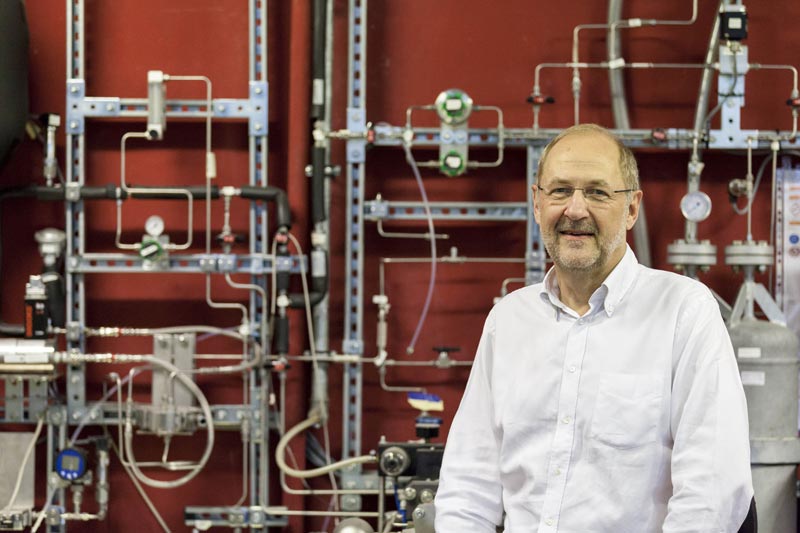

Prof. Dr. Matthias Kraume has secured funding for the third time for his Collaborative Research Center InPROMPT.
© TU Berlin/PR/Felix Noak
For the third time, the German Research Foundation (DFG) has approved funding for the Collaborative Research Center/Transregio 63 on Integrated Chemical Processes in Liquid Multiphase Systems (InPROMPT). More than 60 scientists are participating in the major project at a number of universities across Germany. TU Berlin is the host university. The DFG is providing the CRC/Transregio 63 with approx. 9 million euros over the next four years.
In the first two funding periods of the major project, the researchers have already succeeded in developing new operations for processing bio-based raw materials (e.g. vegetable fats) for the chemical industry. “Thanks to the renewed funding, we can now build on these achievements in the third and final funding period from January 1, 2018 to December 31, 2021. We want to further develop the processes and trial them in pilot plants,” says Prof- Dr.-Ing. Matthias Kraume, Spokesperson for the CRC/Transregio 63.
Research aim
The DFG has been funding the CRC/Transregio 63 since 2010. The participating scientists and researchers are currently working in 14 projects to identify a replacement for the increasingly scarce resource of crude oil using methods from chemistry and process engineering.
The focus is on the use of renewable raw materials and highly efficient catalysts in order to develop novel, efficient production processes. In this way, starting from renewable raw materials valuable products and intermediates such as biopolymers can be manufactured for the chemical industry. A special feature of the research project is that all levels of the processes are taken into account, from the basic molecular steps to the design and operation of the entire industrial plant.
Important findings
In the past eight years, the CRC has successfully developed innovative phase systems based on the principles of green chemistry in order to produce chemical processes. Phase systems form the environment in which a reaction takes place. The phase systems under research in the CRC enable reactions with high yields and selectivity. Complete industrial processes based on the phase systems investigated by the CRC have until now rarely been implemented in practice as operations lack the necessary physico-chemical, procedural and systemic foundations.
For this reason, in contrast to other research groups, the CRC/Transregio 63 has adopted a comprehensive interdisciplinary approach. Alongside investigations into basic principles, the teams are modelling individual processes as well as the process as a whole, before implementing and validating the processes in pilot or “mini” plants.
In the first two funding periods, the CRC has already proven the suitability of three innovative phase systems for various bio-based raw materials such as fatty acid derivatives. There has been a sharp increase in national and international interest in these innovative phase systems, which are sometimes also referred to as “advanced fluids” or “switchable solvents”.
Industrial application
Prof. Dr.-Ing. Jens-Uwe Repke is responsible for validating the processes in the mini-plants. For the CRC/Transregio 63, research with mini-plants is a key basis for arriving at reliable results. Mini-plants are small pilot plants that simulate the large plants used in practice on a small scale in order to develop a realistic understanding of the processes and trial technical changes to working methods. The mini-plant used in the CRC/Transregio 63 is employed in converting unsaturated hydrocarbons known as alkenes using hydrogen and highly reactive carbon monoxide.
Undesired by-products which can inevitably arise during the reaction are separated from the desired products and prepared for repeated and multiple application. The final products formed are valuable chemicals that are used in products in many areas such as the manufacture of various plastic items, adhesives and leather auxiliaries and cosmetics. In the coming funding period, Jens-Uwe Repke will work in his project, which is part of the newly established project area on Integrated Process Development, to trial and validate process concepts and process control strategies for new reactions.
Outlook
“The central aims of the CRC/Transregio over the next four years are to continue developing the physico-chemical and operational principles of the processes under investigation and to enhance, integrate, trial and validate the methods for rapid, systematic, model-based process development using two reactions.” The reactions under research have been selected as they are representative of other reactions,” explains Prof. Dr.-Ing. Matthias Kraume.
The CRC is developing methods that can be used to quickly and reliably devise optimal manufacturing operations for various chemical products based on renewable raw materials.
Cooperation partners
Alongside TU Berlin, TU Dortmund University and the Otto von Guericke University of Magdeburg, participants include researchers from HTW Berlin – the University of Applied Sciences, TU Darmstadt, the Karlsruhe Institute of Technology (KIT) and the Max Planck Institute for Dynamics of Complex Technical Systems in Magdeburg. Doctoral candidates at the participating institutions have the option to carry out dual PhDs.
Photos for download www.tu-berlin.de/?id=190988
For further information, contact:
Prof. Dr.-Ing. Matthias Kraume
TU Berlin
Chair for Process Engineering
Tel.: +49 (0)30/314-23701
Email: matthias.kraume@tu-berlin.de
http://www.tu-berlin.de/?id=190988












